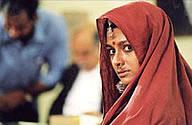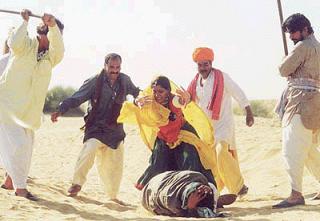

Because of the type of film it is, it is extremely hard to say anything bad about Sand Storm, which tells the story of a woman trying to find justice after a vicious rape. Sand Storm is based on actual events, but because these events are most likely unknown to domestic audiences, it is hard to discern what was real and what was fictionalized for the film. Herein lies the dilemma. Some of the events and people are so incredulous that it is hard to believe that things like this can happen in the modern world. At the same time, the film takes place in India, where gender equality has yet to reach the level it has here.
Sand Storm deals both with gender issues, caste issues, and the relevance of tradition in the modern world. Saanwri Devi (Nandita Das, Lal Salaam, Pitaah) was of a lower caste. She made pots and her husband Sohan (Raghuvir Yadav, Lagaan, Asoka) pedals a rickshaw in town. They are on the bottom of the caste system and dirt poor, and everybody knows this. In order to obtain more money, Saanwri stumbles into a government job that promotes equality for women. Her job is to tell women that by law, they have rights, and to protest injustices like child marriage. Her village elders, who are part of a higher caste, do not like what she is doing. At one point, five of them attack her husband, and rape her while he desperately tries to help. Although she is clearly the victim, she becomes an outcast in her own village.
The gross injustice comes in her attempts to find recourse. At every turn, somebody stymies her attempts. The local police are corrupt, refusing to take a complaint. The local government is corrupt, giving empty promises to help. The male doctor is corrupt. The women's jail she stays in for protection mocks her. As she makes her way up, political groups help her because it is opportunistic for them, and people use her to further their own careers and causes. Rape in this country is a mark of shame. People are more likely to look down upon the victim than do anything to help. The only person out to help her is Shobha Devi (Deepti Naval, Leela, Shakti: The Power), the woman who initially hired her.
Many of the people that Saanwri encounters are so flat and backward that it is hard to believe that somebody today can act like that. Yet, that is exactly how some people act in this situation. A good case in point is the Kobe Bryant case currently making its way to trial (and currently a media circus). The important distinction is that Bryant is charged with rape, and Saanwri, in the film, was clearly raped. In both cases, the defending side proclaims innocence and immediately begins calling into question the veracity of the accuser. This is not in any way a judgment on Bryant's guilt or innocence, so no letters please.
Sand Storm was directed by Jagmohan (Monsoon, Perfumed Garden), and written by Jagmohan, Ashok Mishra (Conflict), and Sudha Arora, with dialogue by Hariram Acharya and Deepak Purohit. It was banned in India because of its political content; Jagmohan and the writers attack the government for its complacency and inaction. This may not sound like much, but in Bollywood, on-screen kissing is still rare. They stumble with their narrative structure, told mostly in flashback. Amy (Laila Rouass, The Four Feathers, Split Wide Open) is a journalist who wants to write about Saanwri. As she delves into Saanwri's life, she interviews the various people that come in contact with Saanwri, and then Jagmohan flashes back to the actual events. Amy doesn't really bring anything to the story, and is more of a distraction than anything else. Saanwri's story is moving enough on its own.